Day 99, June 19
The Pacific Crossing
On June 16 we were scheduled to depart China on the container ship, Hanjin Copenhagen. It is probably a case of the tail wagging the dog, but this leg has been the anchor of the entire trip and has controlled all our scheduling. Once you commit to going around the world without airplanes, you have to figure out how to cross the Pacific Ocean, and there are remarkably few options. Only a handful of conventional cruise ships even do this anymore, and none were feasible for us. The only other option was a container ship. Almost a year ago I started researching this on the internet—our two travel agents had long since thrown up their hands, concluding that it was simply not possible to do what we wanted to—and found that there were actually three or four companies that facilitated a “freighter-cruise.” I chose Maris because it was the only company that would actually commit to a specific date. What I did not know then was that the “specific date” or the “specific ship” would change at least a half dozen times before the Hanjin Copenhagen (actually the third ship we were assigned to) seemed to stabilize as a viable option toward the end of December, around three months before our departure date. So we gave Rebecca, our agent at Asia Transpacific, the ok to finalize everything for the umpteenth time for the China leg.
By the last week of February the departure date had changed again three more times. We decided not to pass this information along to Rebecca for fear of triggering a nervous breakdown or worse, a possible suicide attempt. But we did have to commit at some point and by mid February decided to go with the departure date in effect at that time. With fear and trepidation we held our breath and requested “one more last change,” which meant dropping the last week of the China leg since the ship’s departure was now on June 16 rather than June 23. Rebecca made all the changes without complaining, tried to get back as many deposits for the cancellations as she could, and emailed back, “This is it. No more.”
So we were now committed to June 16 and had no more wiggle room, no fail safe options. We also noted that the Maris contract stated the departure date to be “on or about” June 16. You can imagine my confidence level in Maris at this point though I have to admit that they were always responsive, professional and straightforward about the whole thing. It is simply the territory that goes along with a container ship crossing. It is not Maris’s fault anyway. All they are doing is matching passengers up with a containership, which they have no control over.
Now to be honest, from day one of trip planning I had misgivings about crossing the Pacific Ocean on a container ship. I know that this sounds out of character for a sailor and one who loves the sea. This was due in part to fear of the unknown but mostly due to an article I read in the New Yorker, where the author described her experience on a container ship as one of the worst of her life. She talked about the endless boredom, the absence of any amenities or opportunities to do anything, no opportunities for a decent workout, the lousy food, the Spartan, cramped living quarters, and the lack of human contact since the crew was always working. The only thing comparable, she said, was being in solitary confinement in a maximum security prison, except that was better because at least there you had hope of a possible escape. What caused me most concern, however, was that if we were assigned to a small cabin with no light because the porthole was blocked by a container, I would go into a claustrophobic panic attack.
The crossing would take 17 days. Seventeen days in such conditions as described in the New Yorker article and no light? I was not sure I could do it. But I got a grip and with grim determination, convinced myself that 17 days actually was not all that long. And besides there were no other alternatives if we were going to go around the world without flying. What the hell? At least I would have another chapter for the blog.
If I survived.
So you can imagine that when I received an email message from Maris that the ship would not depart on June 16 as originally scheduled, I was not surprised and immediately extended the stay at the Mansion Hotel in Shanghai for another day. The next morning, however, June 17, we received the joyous news that the ship had arrived safely at the Shanghai container port and that a driver from the port would pick up at 1300 (1:00 pm). I felt combination of relief and anticipation. One reason for the anticipation was all the elaborate paperwork that Maris required: evidence of yellow fever vaccinations, evidence of insurance, certified health forms (which fortunately did not require any mental health certifications), which I cajoled the doctor in Beijing into signing, and two or three other signed documents of some sort. Would all of this be in order and would it be sufficient to allow us to board?
The driver arrived on time and off we went in heavy rain, which had been falling steadily in Shanghai for the past two days. The drive to the port took almost an hour; and once we passed through the security gates at the port, passing by thousands of containers stacked on top of each other 10-13 containers high, it was another 30 minutes before we arrived at the Chinese Immigration Office where we were met by two guys in their 20s wearing tee-shirts, cut off jeans, and who spoke no English. They moved our bags from the cab to another car and lead us into the immigration office where a lone official sat behind a counter in an otherwise totally vacant and forgotten room. Our “handlers” walked over to the counter and then returned to say the immigration officer was too busy and could not process us now. We would have to wait outside, not in the vacant waiting room. We trudged back to the car in the rain. Meanwhile one of the handlers asked for the passports and disappeared. It was an eerie scene: rain steadily falling, a gray mist creating a veil so you could barely see the buildings, and no people to be seen, no cars, no sign of life. We had ended up in a desolate corner of the port, seemingly off limits to everyone.
We waited patiently for fifteen minutes, which became 30 minutes and then an hour. The driver was engaged in watching some Chinese sit com on his iPhone. The rain continued. I thought that we could mysteriously disappear from this forlorn and forgotten spot, never to be heard from again and no one would ever know. Then miraculously the other guy, the one with a button that said, “Live it up, babe!” appeared at the car door waving the passports and motioning for us to follow him back to the immigration office where we found the officer in exactly the same posture as he was in a hour and a half earlier—sitting at an empty desk, staring blindly into space in an abandoned office. Our handler handed him the passports. He stamped them. We rushed out of the office, stamped passports in hand, asking no questions.
It took another 15 minutes to get to the area where all the ships were. As we left the strange, secluded area and turned onto one of the main streets we rejoined the action—hundreds, perhaps even thousands, of giant trucks with empty flat beds or carrying containers—lined up going in both directions headed to and from the piers.
At the immigration office, we had been joined by a clean cut, earnest, baby-faced young man in his mid twenties, Andrew, who announced that he was also a passenger on the ship. Originally from Seattle, he was returning home from teaching English for a year in Wuhan, a city on the Yangtze near where we had been on our river cruise. He seemed glad to meet us, confessing that he had been afraid he would be the only passenger on the ship.
After a couple of turns, our car came to a halt beside a huge pier with giant cranes on both sides lifting or lowering containers into docked ships . The third ship had its name prominently displayed on the bow: Hanjin Copenhagen. We had arrived!
The next challenge would be boarding. Did we have all the proper documentation—health forms, contracts, insurance, etc.? Would they actually let us on board? How would we get our heavy luggage up the steep, narrow stairway along the side of the ship?
We were met by a lone worker, a young man wearing an orange work suit. Smiling and extending a hand, he said in broken English, “Welcome to the Hanjin Copenhagen! I am Michael, your helper. I am from the Philippines.”
He grabbed one of our suitcases. A coworker appeared who grabbed the other and up we went. I was expecting some kind of formal procedure once we got to the top, but there was nothing—no mention of passports, visas, insurance or any of the other stuff we had worked so hard to get. No security check. We just walked in. There was not another soul in sight.
“Come this way,” said Michael. “Let me show you to your room.”
That was it. We had made it! The penultimate leg, the most problematic, the most critical to the whole journey, the most uncertain and unpredictable . We were now on board the Hanjin Copenhaggen and were headed to our room. I breathed a great sigh of relief: we were now on our way home.
We took the elevator up seven floors to Level G, two levels below the bridge (Oddly the “upper deck” is the bottom floor, the one below Level A.) and were shown our living accommodations for the next 17 days. Instead of the cramped cabin with no light that I had envisioned, it was a two-room cabin with a small bedroom, bathroom and sitting room, the size of a small efficiency apartment. Not bad. There were also three portholes, all facing forward, and none were blocked by containers. The room had a TV, CD player, boom box and refrigerator. I could manage this.
From Michael we also learned that the ship had an officer’s lounge, a small “gym” with an empty swimming pool, sauna, exercise equipment (two stationary bikes and a stair machine), and a ping pong table, and places on deck where you could sit outside. Most important for me was that there was a walkway under the containers all the way around the ship ( three laps per mile). Things were definitely looking up.
We had some time before dinner to rest up and spent the time watching the gigantic cranes take containers off the ship and then start replacing them with the containers arriving on the flat bed trucks. There were six cranes in all. Each one was probably the height of a 15 or 20 story building with a small booth at the top which slid along a track and housed an operator, who lowered and raised the containers. Trucks carrying the containers were lined up below. Empty trucks were lined up in another lane. The truck carrying the container would pause briefly as the giant clamp on the cable grabbed the container, pulled it up, carried it to the spot above where it belonged and then lowered it in place—and not all that slowly. Then the process would repeat itself as the empty truck departed, immediately replaced by another carrying a container. I timed the operation. A full cycle of picking up a container, placing it exactly where it belonged and then picking up a new one, took consistently between 95 and 100 seconds. The reverse operation went on for the containers being taken off the ship. This process–six or more cranes per ship, each one humming and buzzing and creaking and banging—was going on for other ships all up and down the pier, and up and down the other piers. There were scores of ships being serviced while we watched. Like everything else in China, this was on a size and scale unimaginable almost anywhere else in the world except a handful of mega ports.
A word about the Hanjin Copenhagen. The ship, built in 1999, sails under a German flag because it is owned by a German syndicate, with an unpronounceable name. “Hangin”, however, is a Korean company which leases the ship from the syndicate. The German syndicat also has a subsidiary management company, NSB, that provides the crew. Understand all that?
The Hangin Copenhagen is 915 feet long, about three football fields, the approximate length of the Zuiderdam, the Holland America cruise ship we crossed the Atlantic on, though with a narrower beam. The ship can carry a maximum of 5,618 containers and has a total crew 25 including eight officers. The Captain and two other officers are from Poland, another lives in Germany but is from The Ukraine, and the rest are German. All except the chief engineer, who appeared older, would appear to be in their forties or early fifties. The other crew members, the worker bees who do all the heavy lifting, are from the Philippines, and only one person appears much older than mid twenties. Average cruising speed in today’s high fuel cost economy is 17 knots though the ship was designed to cruise at 27 knots, the type of design of most container ships built 20 years ago. It is a race horse, but also a dinosaur since the modern ships are built for fuel economy, not speed. The ship is also small by today’s standards for container ships, which typically carry around 9,000 containers with the megaships carrying up to almost 20,000. The size and scale of these ships and the amount of cargo involved is almost beyond comprehension.
By late afternoon we had rested and were ready to take the elevator down to Level B where the officer’s dining room was. Dinner is served every day at 1730, ship talk for 5:30 pm. The dining room is small with only three tables—two for the officers and one for the passengers. Michael greeted us and directed us to sit at the empty table. The four or five officers eating diner nodded politely as we entered, and the Captain, a humorless guy with a shaved head and probably in his mid 50s, said in a monotone and without a smile, “Welcome to the Hanjin Copenhagen” and continued eating his dinner.
That was the moment that Ron walked in. Ron was dressed in solid black and was small and wiry with a thick head of black hair, a goatee and small mustache, a dark tan, tattoos on both arms and no less than a dozen silver bracelets on his left wrist along with a huge watch. There was no way for me to tell how old he was—maybe sixty, could be a little more or less. He really seemed to have a kind of ageless quality to him.
Ron extended a hand with a smile and said, “Welcome aboard, I am the fourth passenger. I have already been on the ship for over a month. It is terrific. You will love it!”
We learned at the first dinner that Ron was from West Palm Beach, having grown up in New Bedford, Massachusetts, where his family was in the “jewelry business”. (His middle name: “Cartier.”) He had masters degrees in business and social work and had worked in the jewelry business along with other businesses and had run a social service, non profit organization that he founded in Florida which provided guardians for indigent, frail elderly. For the last several years, however, he had been an artist (with his own studio, mainly large, abstract paintings) and a yoga instructor whose clients were mainly the rich and famous living in Palm Beach. He was a passenger aboard the Hanjin Copenhagen in order to complete a book on spirituality that he had been working on for years. Ron, I found out later, was 74 years old—a year older than me!
So when Andrew came down for dinner, all four passengers were present or accounted for: the two of us, a kid returning from teaching English in China, and an older guy on a spiritual journey. The four of us would be eating together three meals a day for the next seventeen days. We would have plenty of time to get to know each other.
Day 100
June 22
Fifth Day At Sea.
It is now day 100 of our journey around the world and our fifth day at sea. We are about two hundred miles northeast of Japan and headed toward the Aleutian Islands at 17 knots where we will make a turn to the southeast and head towards Alaska before we set a course to Prince Rupert, Canada. We should arrive in just under two more weeks. Though it does not seem apparent, because the Earth is a globe, this is actually the shortest route from Shanghai to Seattle. The wind is calm, but there are heavy swells pushing the ship up and down as we cruise along in thick fog, drizzle and midst.
So what were the first five days on the ship like?
The ship left the pier at midnight on June 17. The next morning was cloudy with winds at 5 to 10 knots and lots of commercial traffic. If you looked around, you could always see at least one other container ship and often as many as a five or six. We spent the day as we would spend the next several—breakfast at 0730, lunch at 1130 and dinner at 1730, a little early for my taste, and the food a bit more than I would like– edible but nothing special, basic fare of meat and potatoes — but nothing as bad as what was described in the New Yorker article. Frankly, it was a nice change from the Chinese food we had been eating three times a day for the past month. We managed to find time for a workout in the gym (Embry), two episodes of “Seinfeld,” and one “House of Cards,” along with some reading, blog writing and sitting outside on deck (though a bit chilly). We have established 1645 as the official start of cocktail hour.
For me the most remarkable part of the first five days is how tired I have been and how much I have slept. Every time I paused from doing something and took a break, I felt I needed to lie down and before I knew it was sound asleep, sleeping for two or three hours. I do not recall ever experiencing anything quite like this and was fearful that I had come down with some kind of bizarre, Chinese sleeping sickness. I was sleeping at least 16 or 17 hours a day, as much as a dog. Then I realized it was just my body’s way of catching up. We have been on a rather intense schedule for the last three months and are fortunate that we have been relatively healthy, notwithstanding my “Level 2 Meltdown” in Beijing and stomach flu in Shanghai and Embry’s bronchitis, also in Shanghai. It could have been much, much worse. I could almost hear my body saying, “Peace at last, thank you, thank you.” As my good friend, Doctor James G Killebrew, predicted when I described the Pacific crossing, it was just what the doctor ordered, a “forced relaxation.”
In any event I am happy to report that I seem to have fully recovered from my “sleeping sickness” and now have my strength and energy back and no longer feel the need to collapse for a nap every few hours.
The big deal on the second day of the crossing was our first stop en route to Seattle, in Pusan, South Korea, where we arrived at 1000 on June 19. The evening before I had asked the captain when he thought we would arrive, to which he replied, “We will be tied up at the dock at 1000.” That is what happened, exactly to the second.
As we approached Pusan, South Korea’s major container port, we were one of many ships entering this busy port. About 30 minutes out we were boarded by a pilot, who provided assistance as we navigated along the narrow but well marked channel. The Korean pilot leaped from the pilot boat onto our ship—how do these guys do it?—and then climbed up to the bridge, bowed to our captain and saluted. From the expressions on the faces of the three crew members present, I gathered they were glad he was on board. I watched from the bridge as the Captain, consulting with the pilot, gave orders and calmly but sternly supervised a perfect docking in a narrow spot with no more than a few meters of extra space. A tug boat pushed our stern in as the bow thruster pushed the bow out, and in we slid as if were just another routine maneuver, which, of course, it was.
We were docked in Pusan until two or three the next morning as the cranes did their job taking off some four or five thousand containers and replacing them with four or five thousand new ones, an activity that usually takes about 12 hours. We stayed on the ship observing the action and pursuing our routine of eating, reading, writing, exercising, sleeping, watching vintage TV programs and enjoying cocktail hour at 1645.
The next two days were spent in the Sea of Japan in flat waters with no swell and very light winds. The second day (yesterday) the sun came out in the afternoon. This was a big deal. Except for the few hours that we were above the clouds on top of the the Yellow Mountains, this was the first time we had seen the sun in over a month and a welcomed sight. To feel its warmth and to see the color of the water change from gray to blue was a gift for us and for our fellow passengers, and we all four spent the entire afternoon on deck enjoying the fine weather.
Two experiences stand out the most during this period. The first was the monthly barbecue. The second was the Karaoke party. To fully appreciate these events, you need to know a few things about the crew.
There are 25 crew members, eight middle-aged European officers, and 17 young men from the Philippines, who assist them. The two groups rarely, if ever, socialize during a regular workday. A ship may be the most rigid class system left on the planet. There are separate facilities for eating, socializing, and coffee breaks for officers and for crew, and you never see anyone breaking the code of behavior of no social contact on equal footing while on duty.
The no nonsense demeanor of the Captain may contribute to the all-business nature of human relationships on the ship. We have never heard much laughter from the officers, have seen only a few smiles, and when they eat together, they rarely talk much. They wolf down their food and are out of the officer’s dining room in minutes. It really has not bothered us passengers because we only see them briefly at meal times. I know it is hard, brutal work and you are away from your family for months. There are good reasons to be depressed, one of which is on the Hangin Copenhagen, it seems to be mainly work and little play.
That is why the barbecue was so special. This event took place in the small rec room and balcony on our deck and is an event, weather permitting, that happens once a month for the entire ship–officers, crew, and passengers– when everyone is allowed to socialize without regard to rank or position. When we arrived at the appointed hour of 1730, the deck was already full of laughing people, mainly crew but some officers as well, and officers and crew were talking to each other, drinking beer, listening to the hip hop music blaring from the boom box and thoroughly enjoying themselves. What a change from the everyday class system! Even the Captain seemed to be having a good time though I did not catch a smile. Huge piles of steak, pork and chicken were beside the grill ready for cooking, and salads were on the serving table. Cases of cold beer were next to that. The Filipinos were singing along with the rap music and whooping it up to the apparent pleasure of the officers. Once a month is not a lot, but it surely goes a long way to making the experience of working on a container ship more bearable.
The next evening was the Karaoke party. Another custom aboard the Hangin Copenhagen is to allow crew members to celebrate birthdays on a somewhat regular basis. Sunday evening was a designated ‘birthday night.”
Embry left dinner before the rest of us did, only to return a few minutes later, saying, “You have got to go down the hall. In the crew lounge, they are doing Karaoke and dancing!” Hearing loud music, Ron, Andrew and I immediately headed down the hall. As I peered in the door, someone handed me a beer. Someone else proclaimed, “Joe is here!” And a third guy asked me to dance to some wild music that his buddies were signing to and everyone else was dancing to, which, of course, I did. A drummer was pounding away in the corner. It was the same spirit and frivolity that was present the evening before but with no officers.
There is no telling how long the dancing and singing went on. I left after about 30 minutes, but it seemed that a lot more partying was in the works.
So the first five days went by pretty fast. We settled into a routine of regular meals, planned diversions with movies and videos and regular exercise at the small gym or walking around the “track” below the containers. The weather was mainly cloudy but not too cold. That was soon going to change.
Day 101
June 23
Sixth Day At Sea
Drizzle and fog and temperatures in the 40s started out the day with visibility approaching zero most of the morning. Every so often the ship would sound a long blast on the horn, which I assumed was a warning to some vessel to move out of the way. When I ventured up to the bridge to see how the radar was doing, the fog started to lift, and below on both sides were dozens of bottlenose dolphins playing in the bow wake.
The Captain, who was in the navigation room, saw me and motioned for me to come into the room. In his strong Polish accent he told me he wanted to show me something and then proceeded to demonstrate all the electronics displaying where we were, our course, the weather and visibility. After he had showed me all the data on his computer and assured me that even in the fog it was unlikely we would have a collision, he turned to me and said, “I heard your table at breakfast discussing how bad it was that there was no mention of Tiananmen Square in Beijing on the anniversary of that event. What is wrong with you Americans anyway? Do you recognize the anniversary of Custer’s Last Stand every year? What about Mylai in Vietnam? Do you make a big deal of that every year? Countries do bad things. They do not want to bring them up. You don’t. China doesn’t. Nobody does. Yet you Americans give everybody else a hard time. You are a bunch of hypocrites.”
That launched a discussion of the world in general and the Captain’s view as to what was wrong with it. In a nutshell here is what he said:
“I grew up in a small town in Poland. It was a happy childhood. My family had a nice house and a nice garden, and I went to a good school. You Americans think life was terrible under Communism everywhere, but I will tell you I was not unhappy and neither were my parents. We didn’t care about politics. We cared about having food on the table, a nice place to live, a good, secure job, and decent health care. You Americans do not understand that we had all that under a Communist government in Poland. Sure, there were limits on what you could say and who you could vote for but so what? We had the basics.
“Then along comes the big change in the 1990s. We gained the right to speak freely and to vote, yes. But look at what we lost. We lost our health care. We lost our jobs in many cases and we lost our security. You don’t think it is a problem knowing if you will have a job next year? Believe me, it is big problem. And what did we gain? We gained crime. We gained homelessness. We gained beggars. Compare now and then. For me, I take then any day. And what really makes me angry is you Americans trying to impose your will on everyone and not understanding that there is more than one way to do things.”
“Well,” I said, “That is very interesting. How much is all the cargo you are carrying worth?”
Ron had warned me that the rumor aboard the ship was the NSB would be terminating contracts with expensive Europeans and replacing them with Asian officers.
What was also interesting to me was that the Captain’s comments regarding more than one way to do things and the belief that the U.S. was pushing our values on everyone else was similar to comments we heard in China and in Russia. To a certain extent they have a point. We are pretty provincial in the U.S. and do not know as much about the rest of the world as they know about us and our culture, mainly because of our movies and TV programs, which everyone all over the world watches. And what kind of a picture does that paint of the U.S.?
In trying to change the subject to something less controversial, I volunteered the fact that I was an avid sailor myself and for this reason, took special interest in what it is like to command a huge containership.
“You, a sailor? You know what we call sailors? WAFIs. “Wind Assisted Fucking Idiots.” He was not smiling.
“How much tonnage did you say this ship carries?” I responded.
Despite the minor unpleasantries I have to give the Captain points for showing me the navigation equipment and for engaging in conversation though I suppose it could have been a little less adversarial. I do not think he meant any of it personally. You might say he lacks some social skills. As he left to check out something in the engine room, he said, “I have said this once and I will say it again: come up to the bridge any time. You are always welcome here. Any time.” This time he was smiling.
I was not able to tell if he was unhappy with his job or his life or both or if he just had a quirky personality. When I tired to commiserate about how tough it must be to have a 24/7 job and to be away from your family for such a long time, he countered by saying that it really was not so bad. He had four months on and four months off and had been doing this his entire adult life. He had been a captain of a ship for the past 19 years. He should be making a lot more money, given the fact he was responsible for the safety of crew, passengers, a $50 million vessel and $100 million worth of cargo, but otherwise, no complaints. He was married and had a daughter getting her PhD from the London School of Economics. After hearing all of this, I concluded the answer to the behavior question was mainly a quirky personality.
It was not long after our conversation that the sun burned off the fog, and blue sky and blue sea with whitecaps reappeared though the 15 knot headwind made it too cold and windy to sit on deck very long. Embry and I settled for walking a few laps around the ship
Day 102
June 23
Seventh Day At Sea
So how many times do you get to have a second chance in life? What if you had the chance to relive an entire day? What would you differently? Would this change your life?
Well, if you are on a container ship and cross the international date line, this happens. Yesterday was Tuesday, June 23. Today is also Tuesday, June 23. So what are we going to do about getting a second chance to live the same day?
The answer is nothing. What is more, this is not good news but bad news because I have to add one more day to my countdown for getting to Seattle. It is now an 18 day crossing, not 17 days.
But I have to admit that being able to relive a day in your life raises profound philosophical and theological question such as the meaning of time. Ron, in particular, is very sensitive to the meaning of time and insists that it is all an illusion. You live for the present, he says. You embrace every day, every minute and squeeze meaning out of that. That is how you live life to the fullest.
I also note that Ron, who has now been on this vessel for almost six weeks, follows a very strict routine every day. In the morning after breakfast he works on his book on spirituality. After lunch he does yoga and meditates. When the weather is good, he sits on the bow in a yoga posture for hours without moving. He will take time out for the coffee break at 1500, immediately followed by an hour working out in the gym, then dinner, then reading in the evening. He loves it. He loves the experience on the ship. For him it is exactly what the doctor ordered: no internet, no TV, no email, no news, no interruptions, decent (more or less) meals three times a day, the sound of the waves, the changing sea and sky. What could be more perfect for getting back in touch with your own spirituality, for reconnecting with the spiritual dimension in the universe that for lack of a better term we humans call “God”?
(I really do not know what our young friend, Andrew, does to pass the time away but he does not complain and seems fairly happy.)
But everyone is not like Ron. While I would like to “live for the moment” and reconnect with the spiritual dimension of the universe, I also want to know how the Nats are doing. I want to know how Carolina Blue did on the race Wednesday evening. I am especially curious about what happened with the Supreme Court’s rulings on health care and gay marriage, and I miss the emails from loyal readers of the blog. I miss hearing the latest news from our children, grandchildren and close friends and knowing what is going on in the world. We have only been at sea a little over a week, and I miss being in touch.
(I definitely do NOT miss all the political in fighting in Washington, the paralysis we face in dealing with important issues, the negativism, or any of the 25 or 30 Republican candidates who by now surely must have announced their run for the presidency!)
So that is why when we learned this morning that we would relive June 23, Ron rejoiced and I groaned.
But I also have to say that there is something to be said for slowing down, for having a “forced relaxation” period and for having an opportunity to reflect on the meaning of the Big Trip. Though not altogether easy for a pathological extrovert like me-Embry is much better at this than I am– it is a blessing to have to slow down and to have an opportunity to try to make some sense out of where we have been and what we have seen. So in this sense, maybe reliving June 23 is a good thing, not a bad thing. Seize the moment, as Ron would say. And that is what we are trying to do.
Day 103
June 24
Eighth Day At Sea
For the second straight day it is cloudy, foggy at times, with light winds, big swells, occasional drizzle, and high temperatures around 40. In a word, miserable.
So how do you cope with such conditions, which, by the way, are predicted to continue for the rest of the crossing? You are a prisoner with no options except to grin and bear it. This is one reason few people are crazy enough to hop on a container ship crossing the Pacific Ocean. Maybe the lady who wrote the New Yorker article was not that far off base after all.
But actually it is not that unbearable. The routine continues with good conversation among the four passengers at the three daily meals and two coffee breaks (and an occasional comment from the Captain at the next table, usually criticizing the US about one thing or another). If it is too cold to spend any time on the deck, there is a gym of sorts, a “track” for walking and the there is plenty of time for reading, watching old movies and vintage TV, and of course the 1645 cocktail hour, which has now been enhanced by my brilliant decision to convert my seven day pill container to a small device for making ice cubes (by pouring water into it and putting it in the small freezer compartment in our tiny refrigerator), permitting the consumption of “Chevas-on-the-Rocks,” which heretofore has been impossible since apparently there is no ice anywhere on the ship. Life is looking up.
Day 104
June 26
Passing through the Alaska Passage
Eleventh Day at Sea
We are now officially past the half way mark, and it feels like like we have been at sea for months. The last five days have been cold, foggy and cloudy with rain off and on and high temperatures in the mid 40s, wind chills in the 30s. It has been days since we have seen another vessel or a single bird or creature of any type. We have been in the middle of the north Pacific, in the middle of nowhere, really. If you were doing this for a vacation, you would probably being going crazy right now, fighting off a nervous breakdown or contemplating screaming at the top of your lungs, “Enough!” Unless you were writing the great American novel or, like Ron, were on a spiritual journey and writing a book. We are doing neither, but I am working on the blog and Embry is typing up her extensive trip diary. She is up to page 70 and we have just left X’ian. She says she is exhausted, just reading about our hectic schedule in China and wonders now how we did it. She will have well over 100 pages when she finishes. If we ever decide to try to get a book out of this, the diary will be very important. Were it not for these writing projects, plus a fairly structured schedule, it would be a different story, but as it is we are hanging in there. Here is our schedule for a typical day:
0600 wake up, yoga for Embry
0730 breakfast
0830 blog time for me, reading for Embry
1000 diary typing for Embry, reading for me (or nap)
1130 lunch
1230 “Seinfeld”
1300 “Orange is the New Black”
1400 gym, walk laps around ship
1500 coffee, story time (aloud) with Ron (passages from his book alternating with blog reading)
1600 free time
1645 cocktails (ideally on deck, weather permitting but that has not happened yet)
1730 dinner
1900 movie or two episodes of “House of Cards”
2100 lights out. Adjust clocks forward one hour (nine, one hour forward clock adjustments from Shanghai to Seattle!)
Day 105
June 27
Twelfth Day At Sea
Land Ho! After what seems like an eternity of gray seas, gray skies, fog and drizzle, at approximately 0700 this morning the Hanjin Copenhagen entered the relatively narrow passage (probably at least 50 miles wide) separating the mainland of Alaska from the Aleutian Islands. The clouds prevailed but thinned out just enough for us to get a hazy glimpse of two, snow capped, giant active volcanoes towering 6,500 feet above the sea. At last we were out of the Bering Sea and headed directly to Port Rupert, where we should arrive on Tuesday morning, three days from now. We still have a ways to go but we are in the home stretch.
The evening of Saturday, June 27, was another Karaoke night in the crew lounge. It was much like the first one we attended with more singing and less dancing. Embry was a star of the show singing a half dozen songs, mainly from the Beatles, Simon and Garfunkel, Elvis Presley and James Taylor. They were the only ones out of the thousand or so on the Karaoke device that she recognized. The various singers from the crew were terrific as well, and it seemed that everyone knew the words of just about every song without having to watch the screen. This time one of the officers showed up, the Ukrainian who lives in Germany, who seemed to enjoy socializing with the Filipinos. I thought, now this is really something: a woman almost 70, singing at the top of her lungs with a bunch of Filipinos, all young enough to be her grandchildren, and no one seems to think this is anything strange or unusual. We are on a cargo ship, which is still over a thousand miles from land in a dark ocean where it never seems to stop raining and you are not sure if the sun will ever come out again. The music continues. Everyone is laughing. Beer is flowing. Embry gets a big round of applause when she sits down. This is a special moment.
Day 106
June 28
Thirteenth Day At Sea
We heard the news via ship email from Jessica that gay marriage and Obamacare survived the Supreme Court. Halleluiah! Who would have thought? Hurray for the Supreme Court and for America!
In the same email she told us about the Charleston massacre. Two steps forward one back. Life on the Planet Earth.
At lunch Ron asked me to ask the Captain what he thought of the Three Gorges Dam. It was a setup. Ron had heard the Captain’s tirade on the previous voyage when the ship came across the Pacific from the US. The Captain raised his voice and went on and on about how the weight of all the water in the lake had resulted in titling the planet and from what could understand of his broken English was single-handedly responsible for the climate change we are experiencing today. Somehow dinosaurs and volcanoes entered into the equation. The more he talked, the more worked up he got as everyone else in the room—the four of us and three officers– sat quietly, some staring at him, others looking down at their plates. No one said a word. Then he walked out of the room. Ron smiled and quietly commented, “See, I told you he was crazy.”
Day 107
June 29
Fourteenth Day At Sea
Up at seven. More fog and drizzle. We have now been on the Pacific Ocean two full weeks and have seen the sun on only twice and that was only for a few hours. This follows one month in China when we did not see the sun at all except when we were on top of a mountain which was above the clouds. How does the crew stand it? No wonder some of them seem depressed. (Mainly the officers, however. The Filipino crew seem always to be friendly and upbeat.) Oh well, we are on the penultimate leg of the penultimate leg. We have made it this far, and it could have been far more difficult. We have had no storms or rough seas. We can last for four more days. And there is always the chance, however remote, that, yes, there is a sun and that it will rise.
The question on my mind at 0700 as to whether the sun had permanently vanished behind a cloud bank was answered at 1300. The sun came out! First it peeped through a tiny hole in the clouds. Then the clouds gradually parted, and by 1400 we were basking in the warm sunlight and marveling at the blue sky. It is amazing how being deprived of something basic like the sun enhances your appreciation of it when it returns. My gloomy mood vanished and the whole world seemed brighter.
That afternoon Andrew and I were scheduled for a tour of the ship’s engine room, and while it was difficult to pull myself away from the sunlight, I joined Andrew for the tour with the chief engineer. The size and complexity of the engine area was much grander than I had expected. It was as deep as the superstructure on the ship was high—eight flights of stairs. The engineer took us down the steep, narrow stairs from one level to the next, explaining what everything was as we descended. I could not hear a word because of the roar of the engine. After awhile, the engineer ignored me and addressed all his comments to Andrew, who seemed to comprehend what he was saying. I did take particular notice of the drive shaft, which was the diameter of about four telephone poles, driving a prop that was over 25 feet in diameter. I was also impressed with how clean and neat the entire area was. The other two engineers were working on fixing something, and three or four of the Filipino crew were sweeping and cleaning up. Everyone wore large ear devices to reduce the noise and most wore surgical masks. I could not help thinking how difficult it must be to spend your entire work day in such conditions—no sunlight, intolerable noise, something constantly needing fixing.
After making our way back up the eight flights of stairs, we went into the engine room office where there was a window overlooking the vast engine room and a long consul with several video screens and scores of dials measuring the performance of the ship. The noise abated and we could ask questions. After the engineer discussed various technical items about the ship, complaining that because of high fuel prices a “race horse like this” which could cruise at 27 knots had to crawl along at 17 knots, I could not help asking him how he liked his job.
“Are you kidding me? You can’t be serious. How do I like my job? It is a goddamn prison, that is what it is. I hate it!”
That comment was the beginning of a long diatribe similar to what we had heard from the Captain about the tragedy of life in general. The engineer was also Polish and I wondered if that had anything to do with his and the Captain’s gloomy outlook. Like the captain, he had attended the elite maritime academy because under communism it was the only way besides being a diplomat that you could get out of the country, but the job turned out to be tougher and more demanding than he had bargained for. What he was most bitter about, however, was that most of the officers were being replaced by less expensive Asians. Because the German company he worked for, NSB, could not find a Chinese replacement for him yet, he had been asked to stay on for another four months but after that, no job. No justice.
No wonder these guys are bitter, I thought. In the engineer’s case, he was 64 years old and was eligible for his country’s retirement pension in a couple of years, but even so it would not come close to his current income, and he was facing harder times with very little opportunities for work. All this, plus the fact that he had spent his entire work life below the surface where it was always hot and always noisy and you never saw the sun. Yet instead of being appreciated you get fired because under the new “free market system” the owners go for cheap labor. Hard life, as they say, no justice.
That evening for the first time after Day One of the crossing, Embry and I sat out on the deck for cocktail hour, enjoying the warm sun flooding the deck from the west, and watching beautiful the blue sky, white cloud puffs and green sea. One day like this one and you forget all the gray drizzle of the endless days before.
Day 108
June 30
Fifteenth Day at Sea
We woke on our fifteenth day at sea to Carolina blue skies and sparkling blue waves with small white caps indicating a perfect wind of 10-12 knots. I am convinced that years from now when I am retelling the story of the Great Pacific Crossing what I will remember is this glorious morning and the previous day when the clouds parted and the world suddenly was transformed from cold and gray to magnificent splendor when you could see infinity and all was right in the world. Then, I thought, isn’t this the way our life is, a metaphor of what we humans experience living on this small planet.
The weather held for the entire day and the lives of all crew and passengers were affected. Everyone was smiling, even the Captain, who actually called us twice to report whale alerts; and when we scampered up to the Bridge, he was ecstatic like a kid opening presents on Christmas. “Look! There they are over there, humpbacks! Fantastic! More over there! Look!”
Because of the fine weather we passengers spent most of the day on deck, reading (Embry), meditating (Ron), or just enjoying the stunning scenery of tall mountains and tiny islands (Andrew and I). At 1200 we were boarded by two pilots (one in training), both wearing dark business suits, white shirts and polished black shoes, a bit odd attire for a pilot, I thought, but maybe that is protocol in Canada. After a delay to wait for a berth to open up in the container port at Prince Rupert, we slowly made our away along the coast and up the narrow coastal river, which resembled a Norwegian fiord. Escorted by two tug boats we had to wait patiently in the bay in front of the small town of Prince Rupert for a couple of more hours before we finally tied up at 1900 and the cranes began their work of lifting and replacing over 4,000 containers, a task that would go on all night and most of the next day.
The change in weather from near awful to near perfect was excelled by only one thing: the freshness of the air and its smell of the deep forest and lush evergreens towering along both sides of the deep harbor. There is nothing like it, a kind of primordial smell that connects you to the earth. You can’t help breathing in deeply again and again and giving thanks that you are here in this holy place at this special time. I think about our time in China and how polluted the air is in most places. They would go crazy in Prince Rupert .
As we tied up and the cranes started to empty the ship of containers, it dawned on me. We did it! We have just crossed the Pacific Ocean on a container ship—over 7,500 miles of open water. And we are here, in Canada, at this lovely spot, and only one more full day on the ocean before reaching Seattle. Time for thanksgiving and gratitude.
Day 109
July 1
Sixteenth Day at Sea
We woke up early the next morning and opened the curtains covering the portholes. Sun rays brightened the dark room and deep blue skies were overhead. A second glorious day!
It turns out that July 1 in Canada is “Canada Day,” the official national holiday celebrating the founding of the county some 148 years ago. What is it about the Big Trip that has allowed us to experience so many national events—the Holy Week celebrations in Spain, “Labor Day” in Germany, The Constitution Day Celebration in Poland, Celebration of victory over Germany in the “Great Patriotic War” in Russia, and now Canada Day? (And we will be in Seattle the day after we arrive for the Fourth of July.) Andrew, Embry and I left the ship at 0930 and walked the 2.5 miles to downtown Prince Rupert, a backwater, quintessential small town of about 12,000. The town is located on an island, over 80 miles from the nearest settlement. The port is the main generator of economic activity. There are also a few tourist hotels, a large RV camping area, a Wal-Mart, and the usual kind of main street stores you would expect to see in a town this size: liquor store, drug store, clothes shop, bank, and several diners.
Mid morning we stopped at a coffee shop, taking note of how many Asian looking people were there, descendants of the people who walked across the Bering Straight from Mongolia some 20,000 years ago and the original inhabitants of the area. By 1130 we had seen most of the town and found ourselves on the waterfront, where the holiday festivities were about to begin. Several hundred people—an interesting mix of scruffy Caucasians and Indians—were milling around or seated in a tent or on the grassy knoll in front of a performance tent, waiting for the program to get underway at noon. During the two hours we were there we saw the official flag raising and tried to sing along to “Oh, Canada,” then heard speeches by the mayor, the police chief dressed in bright red like a Royal Canadian Mounty, the chief of a coalition of Indian tribes, that also happened to own the park ground where the festivities took place (for which the tribes were thanked many times), followed by a concert which included the local community orchestra and choir, and several individual singers and bands. The most impressive was a seven-year-old girl who sang country western tunes accompanied by her father on the guitar and mother on the key board. There was face painting, balloons, a pet parade, a food truck, which I patiently waited in line for 52 minutes to get my first real hamburger in almost four months—and it was worth it—and free slices of “Happy Birthday Canada” cake if you got in line early enough, which we didn’t. The back drop to all this were green mountains going almost straight up with hints of snow on several peaks and a huge, blue, natural harbor with several large ships at anchor. Since Prince Rupert is known for its fog and gets on average 120 inches of rain a year, a sunny, warm day like this for Canada Day was, I surmised, a somewhat rare occurrence which brought out the whole town. By the time we left to walk back to the ship, there were probably several thousand people enjoying the splendid afternoon.
This was our reward for the Pacific Crossing—basking in the warm sun on a drop-dead beautiful hillside surrounded by happy people in a picture book setting. It made the whole voyage worth it.
When we reached the ship after passing through security and passport control (where we were not asked to show our passport), we discovered that containers now blocked our portholes, preventing any view and blocking most of the light. This is what I had been most afraid of: being cooped up in a small room with no light, a claustrophobic’s worst nightmare, a kind of prison from which there was no escape. But in our case, it was really not so bad because we had only one more day at sea. This was a friendly reminder from the sea gods that they had really been pretty good to us. This is what it might have been!
As the tug boat pulled us off the loading dock, I chatted with the Chief Officer, the second in command, a slightly overweight guy with a pleasant disposition. He volunteered that this was supposed to be his last voyage because he and all the other officers on board had been fired—as had been rumored and confirmed by the chief engineer–with no forewarning, including the captain. He was devastated. Since all major maritime management companies were dropping European staff in order to save money, at age 37, he now had to find a new career with no real options apparent. However, most officers would stay on for one more US/Shanghai run since NSB was having trouble finding qualified Asian replacements.
“Well, this may be an historic experience for you,” he said. “If you did this next year, you would have Chinese officers and a crew from Sri Lanka. So you would be eating Chinese food and would not have anyone to speak English with. But you probably would not be on the ship anyway since the rumor is they are cutting out the passenger business.”
The beautiful weather held that evening as we left the harbor and the Hanjin Copenhagen headed back out to the Pacific, turning south around 2000 towards Seattle. Embry and I sat on the deck, enjoying warm temperatures and smooth seas until it was almost midnight (and still twilight), finishing off the bottle of wine we started at cocktail hour and watching an orange full moon rise on our port and a dazzling sunset on our starboard while orcas and humpback whales occasionally popped out of the water on both sides. One magical evening like this justifies many times over the entire voyage.
Day 110
July 2
Seventeenth and Penultimate Day At Sea
We woke up this morning in the dark because the containers blocked light from coming in. I pulled back the curtains and tried to see what the weather was like but could only see red and blue containers until I opened up the porthole and poked my head out as far as I could and looked up. Fog! And howling wind! Just so you don’t forget how special the day before was, the sea gods remind you again: it is not always this beautiful, baby, as it has been for the last two days. And don’t forget, your portholes could have been blocked the entire trip. Be grateful.
Which we were.
We were due at the Seattle container port very early the next morning so today was effectively our last day at sea. By late morning the fog had lifted and you could see the mountains on Vancouver Island on the Canadian coast on the port side. The wind was howling at 25-30 knots, with white caps turning the sea white, spray in the air and huge waves, a thrilling way to end an 8,000 mile journey, though too cold to sit outside for very long and too dark for my comfort in our porthole-blocked cabin. I was thankful that we were not on a sailboat.
We spent the afternoon reading and writing. As luck would have it, after dinner the wind died to a 12-15 knot tailwind and it warmed up, so sitting on the deck one last time was in the cards and we made the most of it, admiring the tall peaks on Vancouver Island, waiting for the almost-full moon to rise, enjoying the sunset and looking for whales, which we did not see. Our adventure on the high seas would soon be over.
It is still probably too early to be able to put the container ship crossing into proper perspective. On the one hand, it was far better than I had expected and far better than it would have been if we had had the bad luck of having our portholes blocked the entire time or had to weather a storm or had no sunny, pleasant days to compensate for the chilling rain and fog. While spending three meals a day with the same people for eighteen days can be a bit tiresome, both Ron and Andrew were upbeat, positive about the experience, never complained and were interesting people, if at times a bit quirky. Andrew knows a lot about China, and his experiences added depth to ours. Ron’s spiritual journey was intriguing. We took turns at the afternoon coffee breaks at 1500 to read to each other, Ron from his book and I from the blog. I found Ron’s book, mainly personal stories about poignant experiences, to be very well written and thoughtful. He has an editor and an agent and plans to release it on Amazon in December. I wish him luck and agreed to write an endorsement. One could do much worse than we did regarding our fellow passengers, and if you had a complainer or a whiner or some who was totally incompatible, that would have been a disaster.
The officers and crew were cordial and at times friendly though they had lots of work to do and little time to socialize with us. That they have all gotten pink slips is probably why the mood of the ship was gloomy at times. The Filipinos, however, were always friendly and always smiled and said hello whenever you passed them. Everyone seemed to work very hard all the time.
As for the Captain, he remains an enigma. He at times was very friendly, going out of the way to alert us to a whale sighting or to recommend a movie, one of which, “The Book Thief” was one of the best I have ever seen, very artsy and sensitive, not the kind of movie a macho guy would like. He encouraged us to come to the bridge and answered all of our questions. He loved seeing eagles, and he braked for whales. He displayed a written code of ethics on the bridge that stated that no bridge officer should ever yell at crew and always should treat them with honor and respect. On the other hand, his moods were unpredictable, his manner at times intimidating, his obsession about conspiracies and US failings a bit weird, and his sense of humor a bit weak. I have to admit, however, I liked him.
But a voyage like this is not for everyone. The main adversary depriving you of a good time is boredom. You have to anticipate it and plan ahead for it. I give full credit to Embry for bringing along movies and DVDs of great TV episodes like “Seinfeld,” “House of Cards,” and “Orange is the New Black.” Without such diversions you would be at risk of going nuts. Having writing projects to do was also very important and occupied me for several hours each day. Embry spent equal time typing up her diary. All in all, I probably would not recommend this to someone looking for an enjoyable vacation. On the other hand it is an adventure and has an authenticity that far exceeds anything you would find on a cruise ship. Would I do another crossing on a container ship? To be honest, probably not. Am I glad we did it? Absolutely!
Day 111
July 3
Seattle
The Hanjin Copenhagen arrived safely in Seattle around 0500 this morning when we were still asleep. At breakfast when we said our goodbyes to Andrew and Ron, it felt a little like summer camp. Your special, somewhat intense, relationship with strangers has come to an end, and you will probably never see them again, another one of life’s bittersweet moments. Were it not for the blog entries and Embry’s diary, over time our minds would tend to forget the down times and the long dreary days in the north Pacific and Bering Sea and remember only the sunshine, the crew parties, the stories and the adventure of crossing the world’s largest ocean on a cargo ship.
The Captain was in a stellar mood at breakfast, smiling and asking us what we thought about the voyage. When we complimented him , he smiled even broader and told us what great passengers we were and hoped we would do this again. Sadly the next time would surely mean a different crew, and all we could do was wish them well on the next leg of their life’s journey.
But what a journey this has been for us. A voyage of a life time! The Pacific Crossing has come to an end.
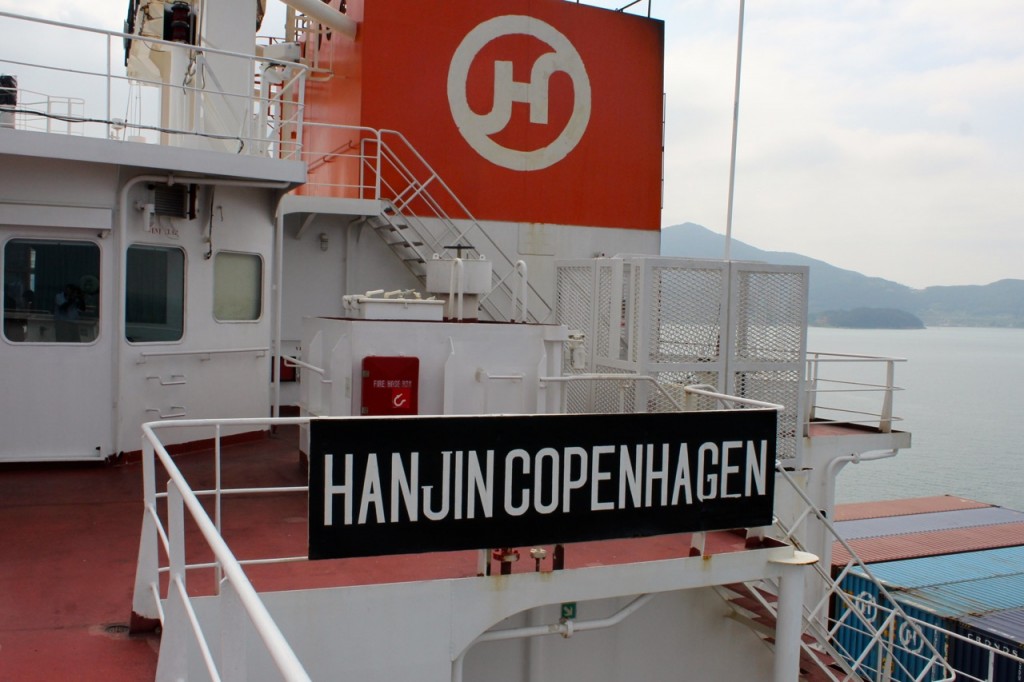
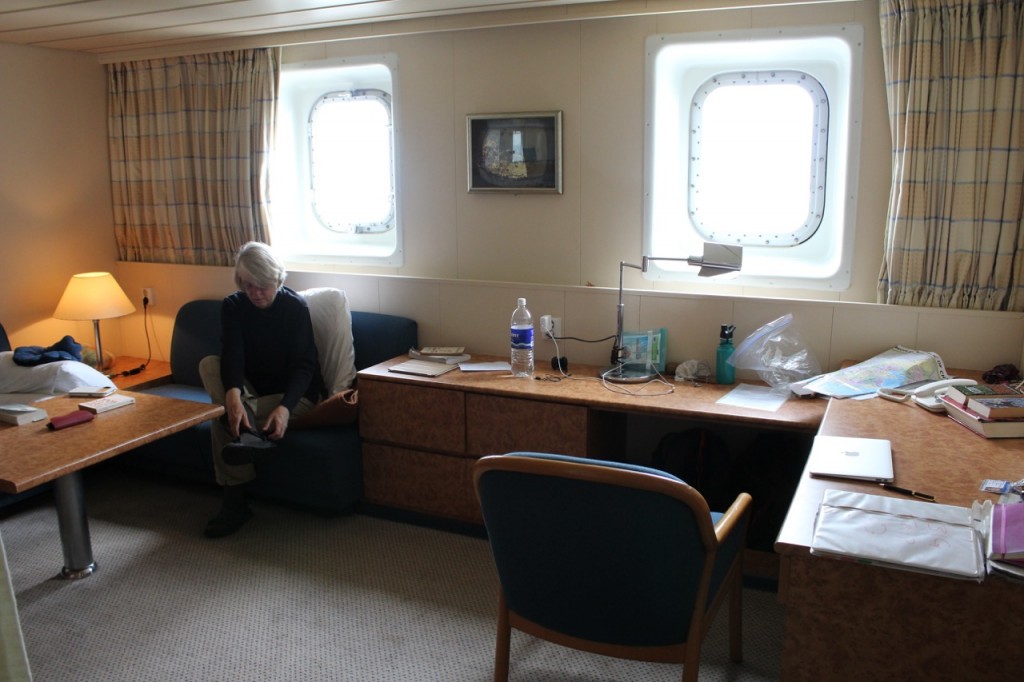
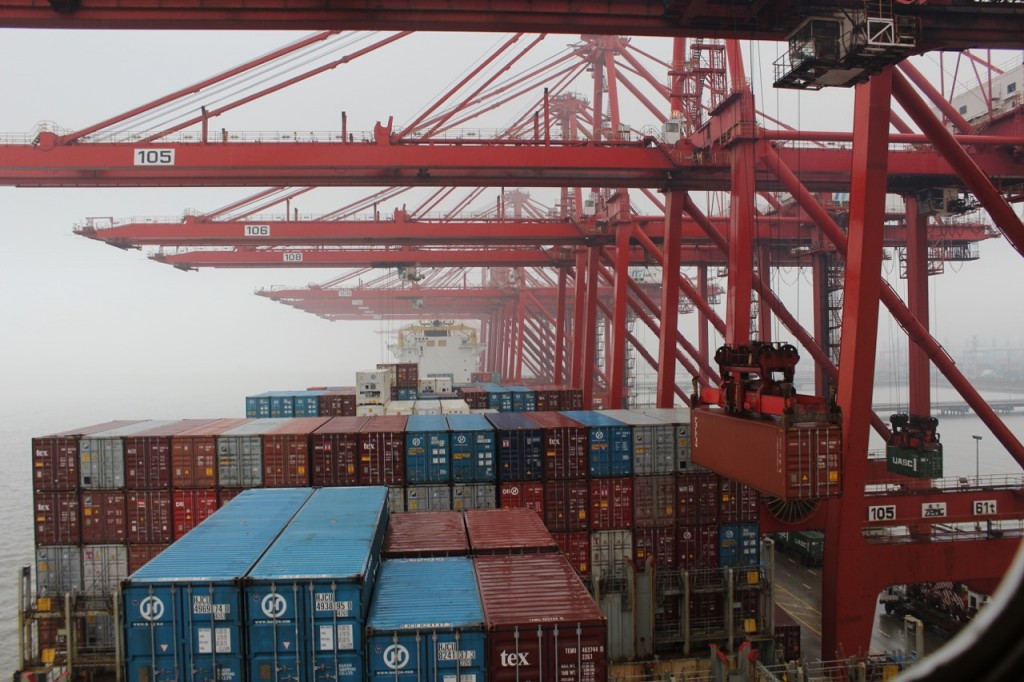
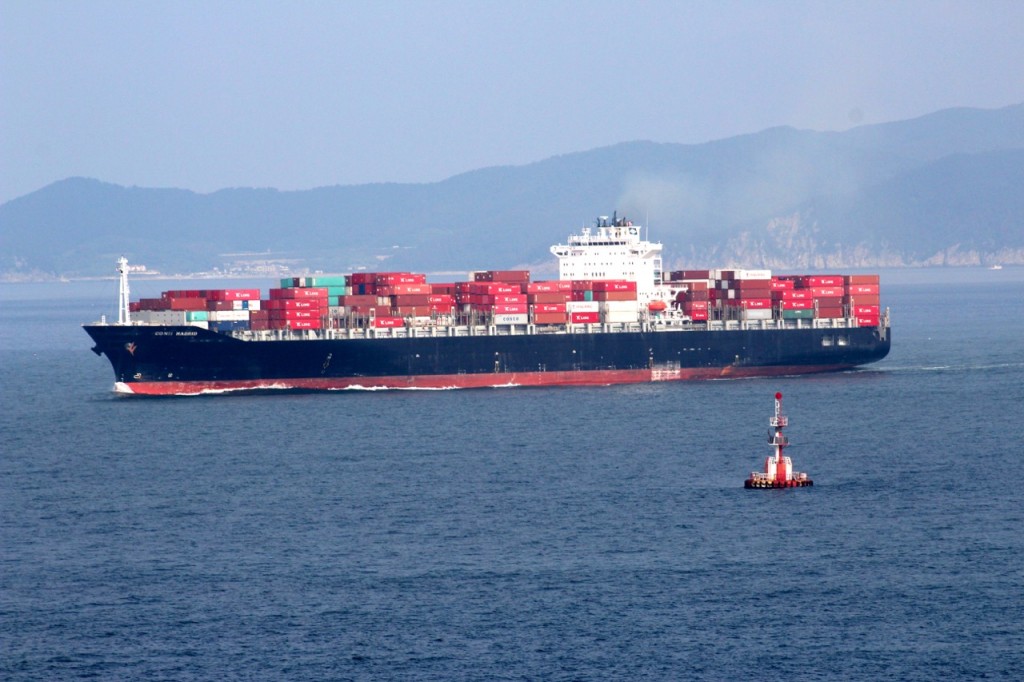
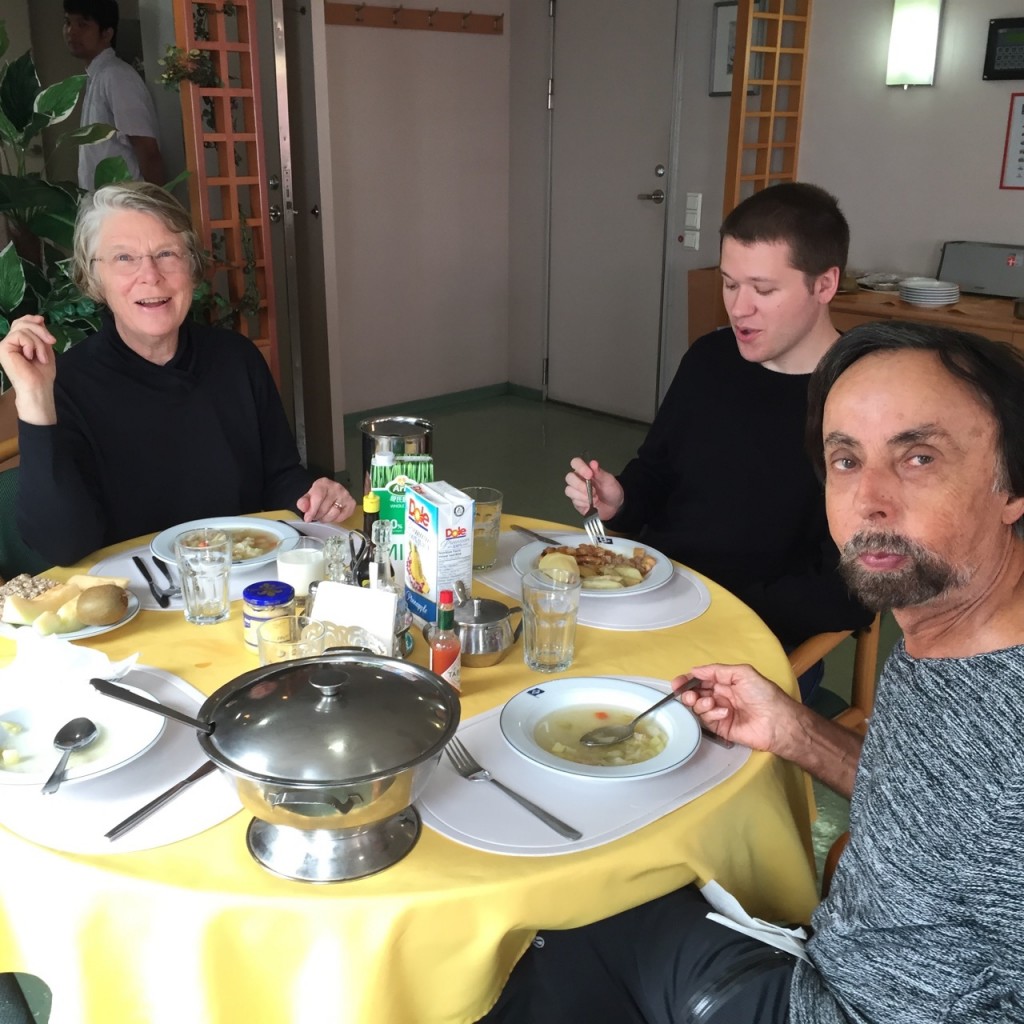
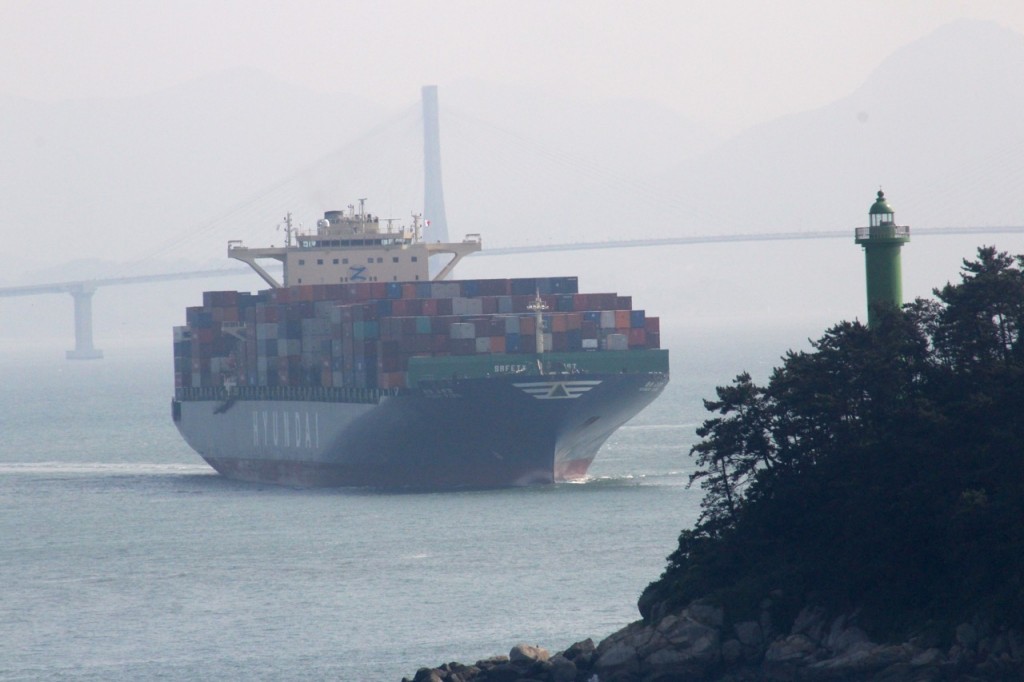
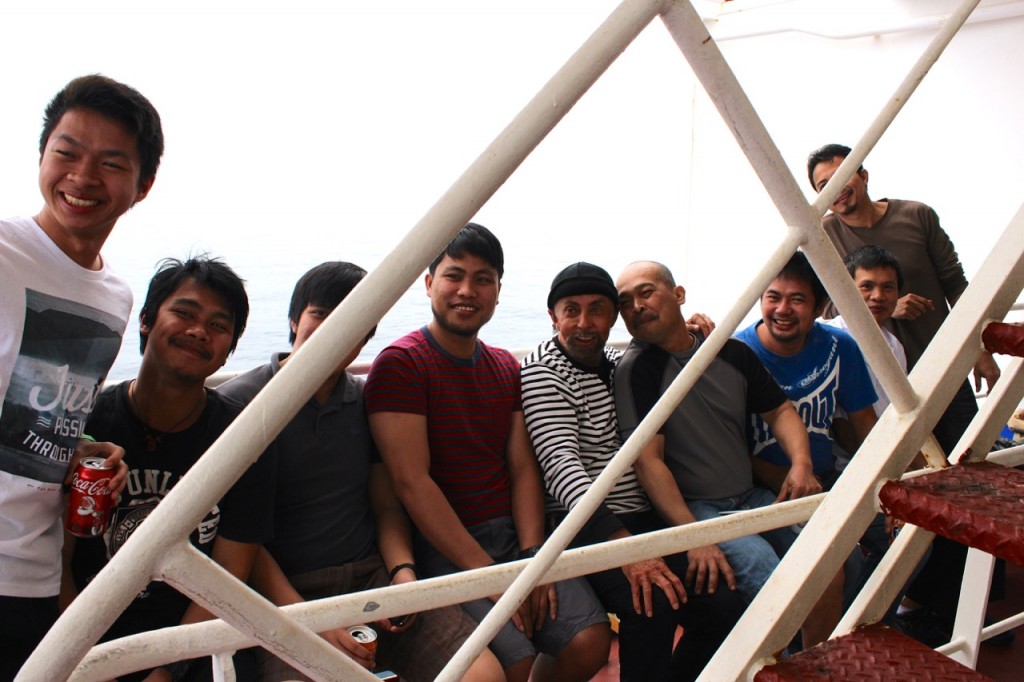
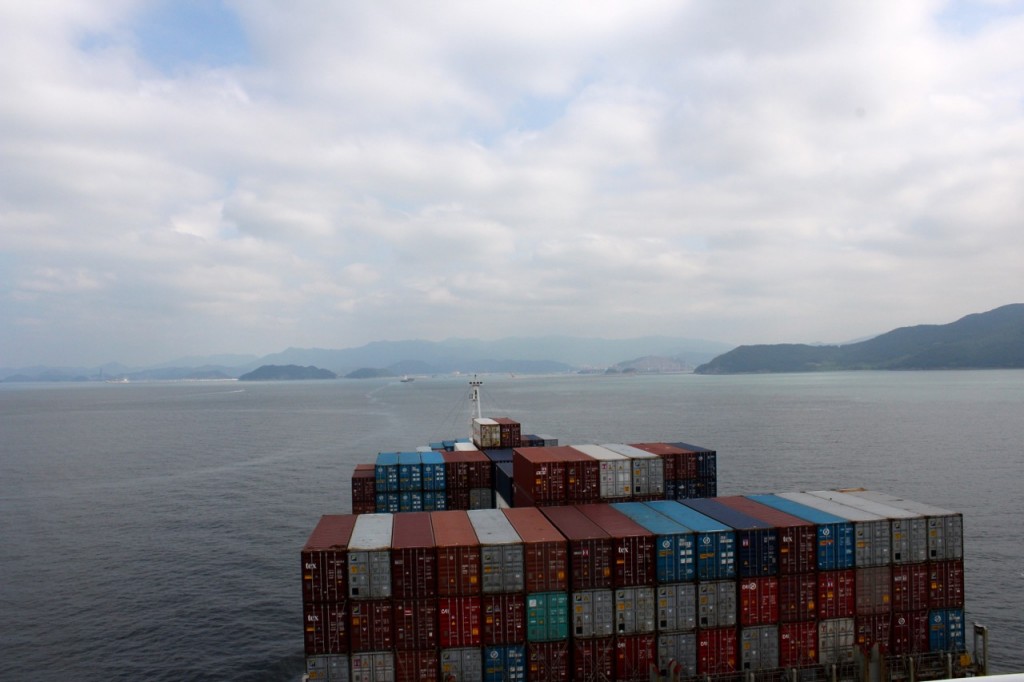
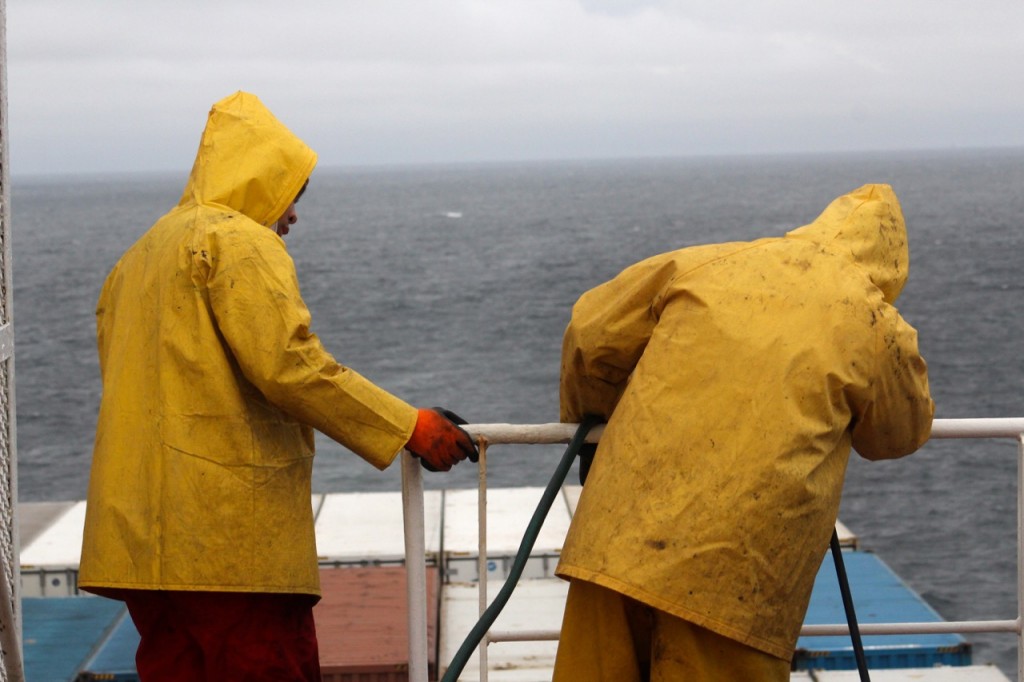
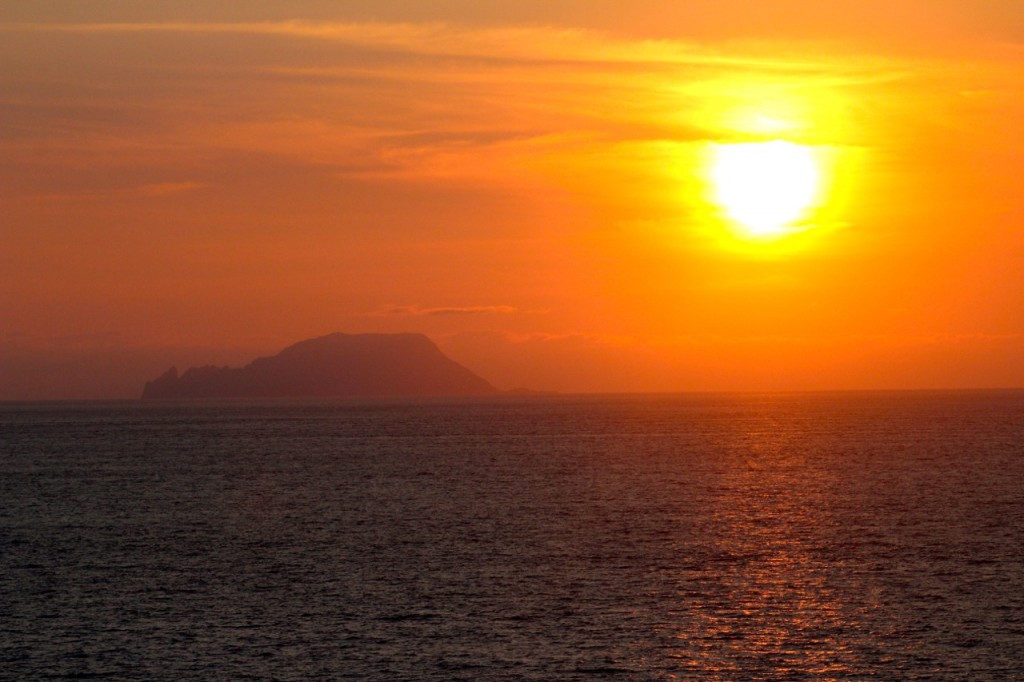
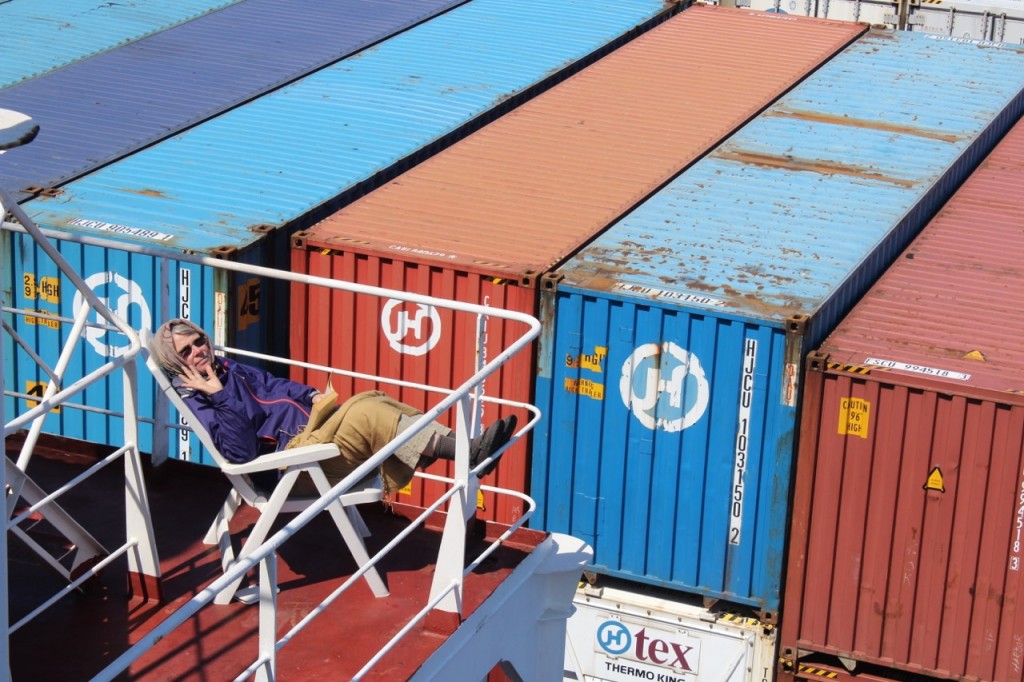
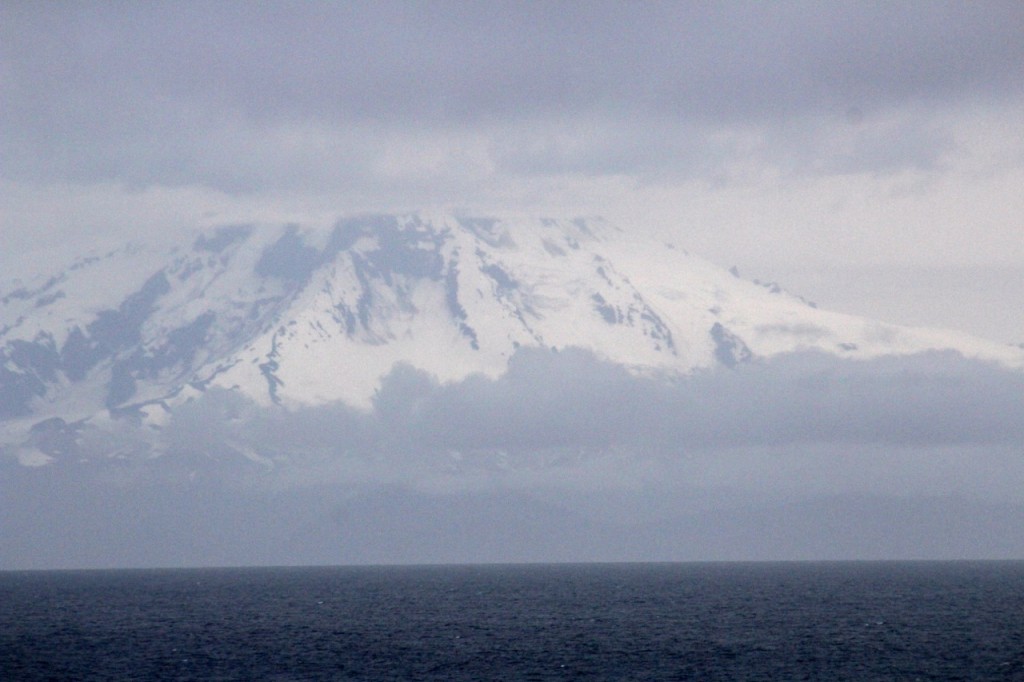
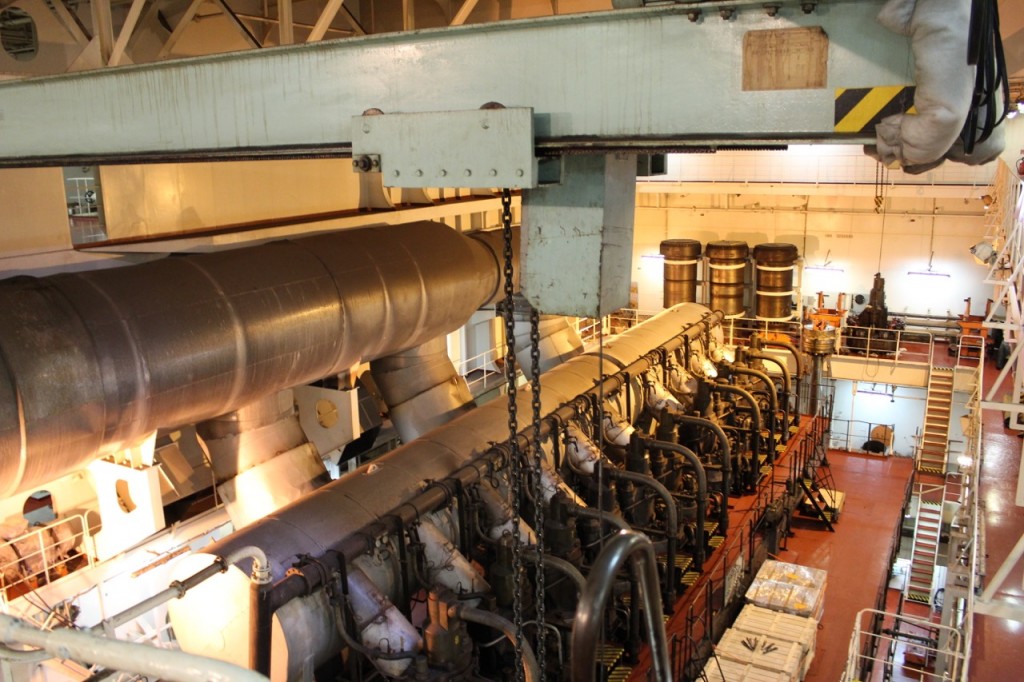
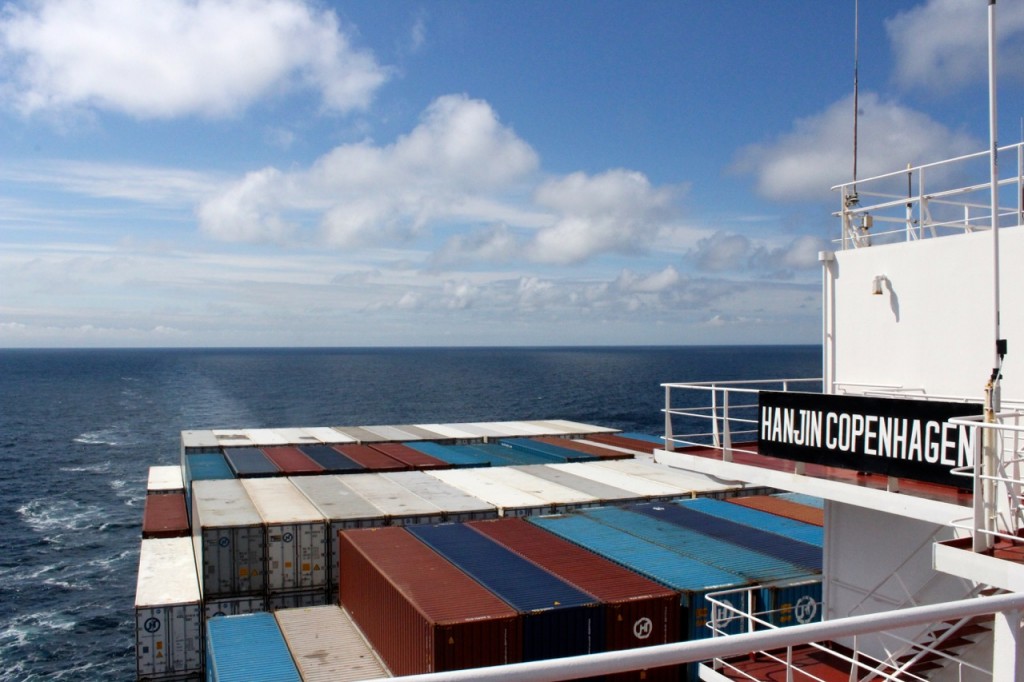
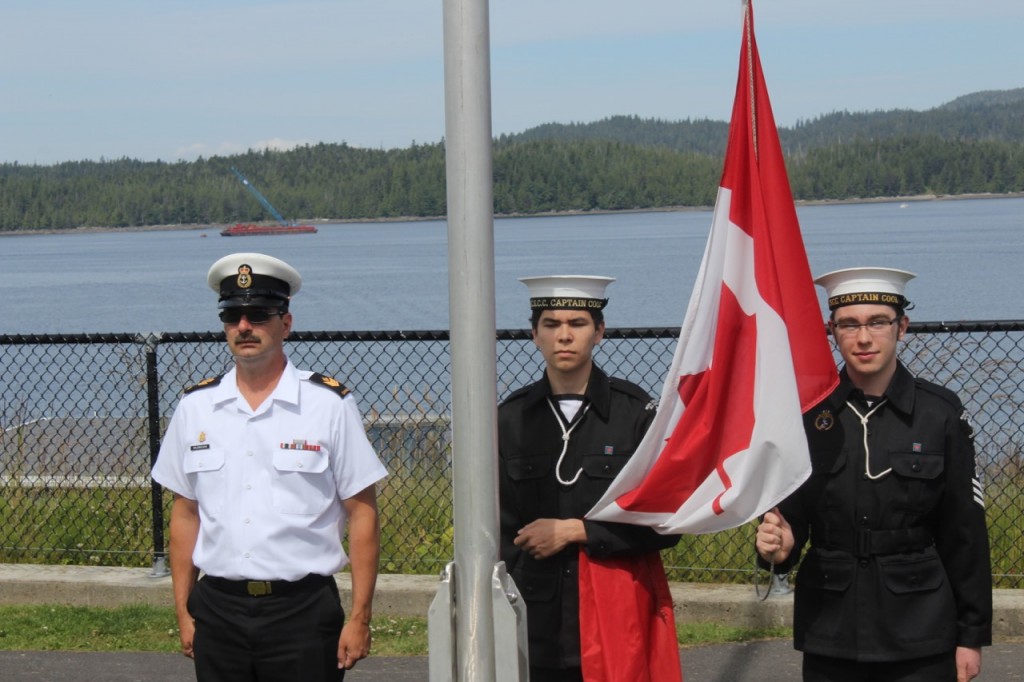
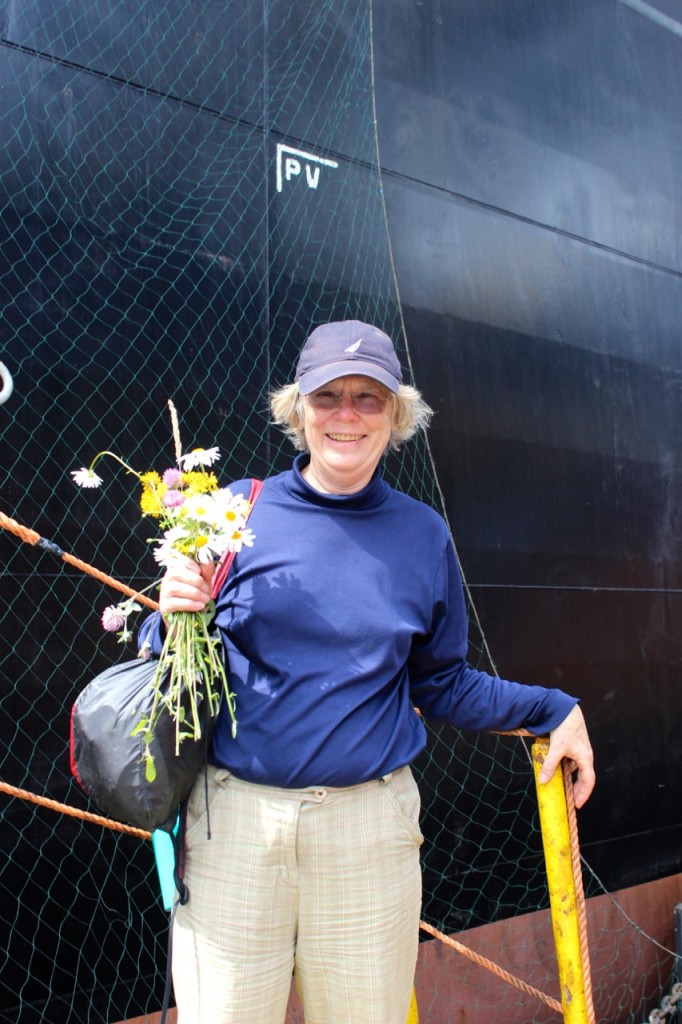
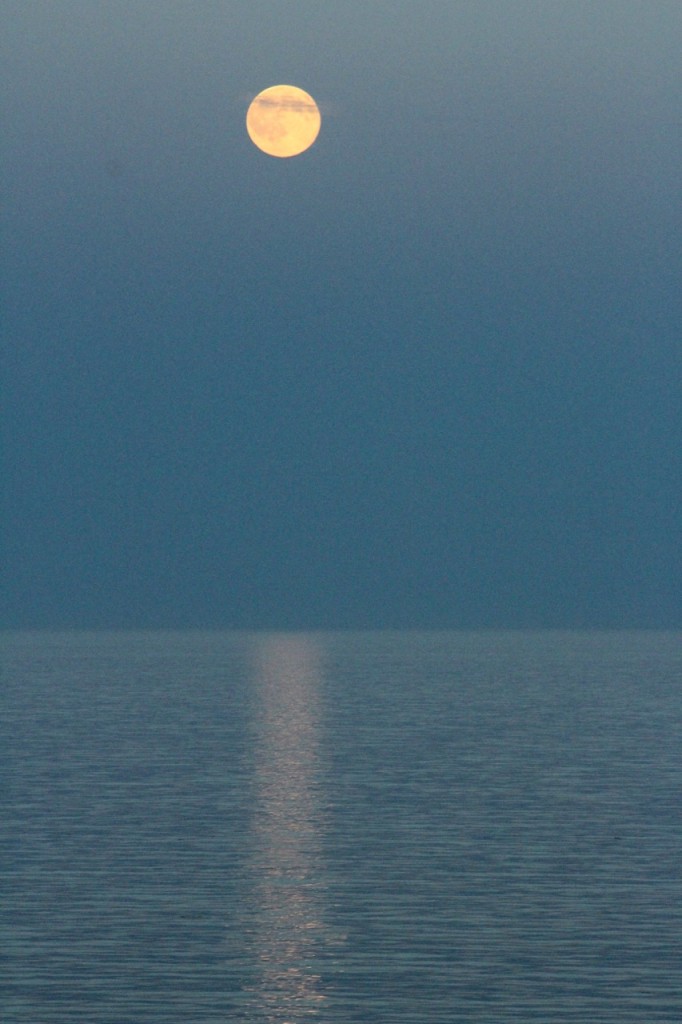
Great experience around your Pacific crossing. But most important Joe and Embry it is wonderful to have you back safe and sound in the U.S.
Andy
Whoao! I have been reading this blog entry for over an hour now and could not leave it, although I have a lot to do. I feel like I too crossed the Pacific on a container ship. Your thankfullness for good times is contagious and your kind acceptation of other people’s frailties is inspiring. You are a great person Joe, and so is Mimy.
Terrific! Each episode eagerly awaited and brilliantly written by both of you – to the point where I feel I have experienced what you have experienced! Put my name down for the first copy of your book!
So glad it worked out for you; a fabulous idea; a fabulous experience and I’ve been really grateful to be able to share it with you.
Roger
Wow.
And to welcome you back, a display of fireworks the very next day.
In a few days, we can see how you rank the “fare” (food) on Amtrak vis-a-vis the freighter and other conveyances in your overall journey, and in and around other places on your grand trek.
Great reading, Joe — your best one yet!
Many thanks, John
Welcome home! What amazing trip you have taken us on. I am sorry it is over. Can’t wait to see you all. We are at Pawleys all the family for the 4th. Let us know when you are headed south, Jane
Congratulations, world travelers and fearless adventurers. It has been pure pleasure to follow your voyage through these blogs. Informative, insightful, sometimes surprising, always engaging. I marvel at your vision, tenacity, and planning skills. Carolina blue, typing the diary, 1645 cocktails, House of Cards, smiling Filipinos and moody Poles — each detail tethered your container ship to my own memory bank. Yes, life is an amazing journey. Before you are out of the habit, let’s do 1645 cocktails while the skies are still sunny.
Thank you, Embry and Joe, for this wonderful travelogue. Roy and I have enjoyed every word.
Back to Paris at 2 AM today, l found your mail posted on the 4th of July. I just could not quit reading the story of your crossing on the Hanjin Copenhagen and the whole fight before being able to get on it through agencies, etc. Though l quit at the 105 th day, l ‘m happy to go back to my reading tonight after the temperature of this day calms down.
Beside your diary publishing, l have not yet completely read , l wish you would think of giving also an adventure story about your 17 (18?) days on this cargo. Captivating this experience l must say. You’re heroes as well as inquisitive – in the good sense – persons.
It’s not sure Mimi, resting on the deck amoung thousands of containers on the picture, was dreaming of something else than embracing her lovely grandchildren, at last.
Au revoir, grands voyageurs !
Rejoicing at the thought you’re home or almost.
Mireille
Ditto to all the responses. I enjoyed reading along. I can’t imagine doing what you’ve done, especially the last leg. Out in the middle of nowhere and with weather that made it feel even more claustrophobic. Good for you for having such a wonderful adventure. I shared your link with a few friends who I knew would enjoy reading along as well. I hope it’s not too hard to readjust to life in DC.